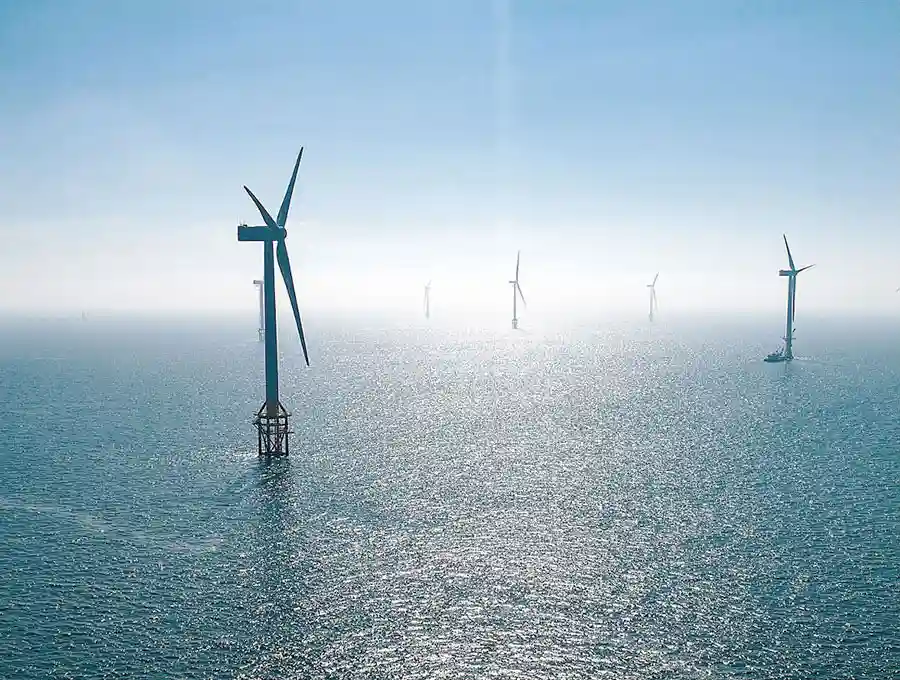Korean Offshore Wind Projects Rejected Due to Inadequate Transmission Network Sparking Concerns of Widespread Unemployment
Korean Offshore Wind Projects Rejected Due to Inadequate Transmission Network Sparking Concerns of Widespread Unemployment

(Image credit: Doosan)
A series of offshore wind power projects are "not approved" due to insufficient transmission network, raising concerns about widely unemployment.
Recently, those projects were reviewed by the Electricity Commission, but most of them were rejected due to "inability" to connect to KEPCO's grid.
Wind power industry: "Most of the workforce who transferred from domestic public energy companies to overseas wind power generation companies is facing unemployment. If the current situation continues, it's enough for wind power companies to withdraw from Korean business."
There are growing concerns that widely unemployment will occur in the industry as new offshore wind power generation projects in the country fail to receive approval one after another due to a lack of transmission networks.
According to a power industry official on the 6th, it was reported that most new offshore wind power project licenses were "disapproval" at the recently held Electricity Commission.
An officer from wind power industry said, "Offshore wind power was able to be connected to the grid when the project was first promoted, but as the shortage of the transmission network has become severe, more and more cases are being rejected at the time of applying for a power generation business license due to 'inability to connect to the grid,' " He said, "In order to determine whether it is possible to connect to the grid, you must first complete project preparations such as obtaining resident consent and measuring wind conditions, and then apply for a permit to the Electricity Commission. However, if the decision is rejected, the time and money you have spent will be wasted."
The problem of transmission network shortage is a problem that is difficult to solve in the short term because it is causing not only new offshore wind power projects but also output control of existing nuclear power plants, coal-fired power plants, and solar power generation facilities. Accordingly, there are predictions in the industry that large-scale restructuring will take place by the end of this year or early next year. Choi Deok-hwan, head of competition cooperation at the Wind Power Industry Association, said at a recent debate held at the National Assembly, "The attractiveness of the Korean market to overseas wind power generation companies is already decreasing significantly. If the project continues to fail by the end of this year or early next year, relevant personnel will be lost. The prevailing mood is that it will no longer be possible to maintain one's position," he said.
He continued, "Despite this situation, the Special Offshore Wind Power Act continues to fail to pass the National Assembly. I hope it will be discussed again in the 22nd Congress as a bill that can really help businesses, such as reserve district selection and additional points," he said.
In January 2023, the Ministry of Trade, Industry and Energy announced the "10th Basic Plan for Electricity Supply and Demand" and presented the government's wind power facility supply target as 19.3 GW by 2030 and 34.1 GW by 2036, with the expectation on expand the proportion of wind power generation.
However, the installed capacity of domestic wind power generation was 1,970.365MW as of the end of last year, which is only about 1.4% of the total power generation facility installed capacity (about 137,300MW) and about 11.5% of the new and renewable energy installed capacity (about 15,796MW). The new installed capacity in 2023 is 169.3MW (total of land and sea), which is only a slight increase from the previous year's new installed capacity (94.8MW), and overall, it is still in the early stage of the market. There are 11 offshore wind power generation facilities installed, with capacity of 150.5MW.
Because offshore wind power is a business that invests a considerable amount of money at the beginning of the business and recovers it over a long period of 20 years or more, it is necessary to have advanced risk management capabilities in terms of finance and engineering.
Accordingly, large overseas wind power generation companies have been pursuing business development by scouting incumbents at domestic energy-related companies by offering them huge salaries. However, they are also at risk of losing their jobs as the business license itself is at risk of being denied due to an unexpected system shortage issue.
An officer from the Electricity Commission pointed out, "Business operators only worked hard after seeing the government's carbon neutral policy, but it is unfortunate that they are left stranded because the government ignores the expansion of the transmission network," He added, "The government needs to enact a special law to expand the transmission network, but there is no progress at all." He continued, "KEPCO made efforts and a special law was proposed, but the Ministry of Trade, Industry and Energy is not making any efforts to persuade the Ministry of Strategy and Finance or the National Assembly to invest finances. "Even the ruling party forcibly included a clause in KEPCO's self-rescue plan that would reduce investment in the transmission network," he said, adding, "We need to think seriously about whether it is right to neglect business operators who jumped in according to national policy like this."
Source: 에너지경제(m.ekn.kr) / by Jeon Ji-Seong
